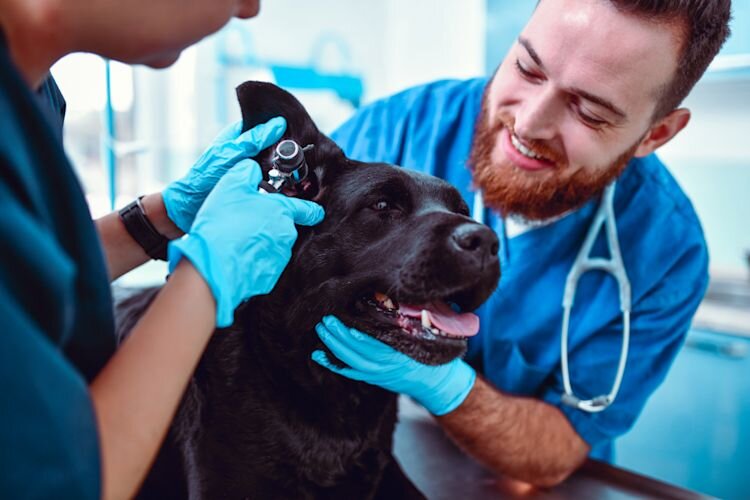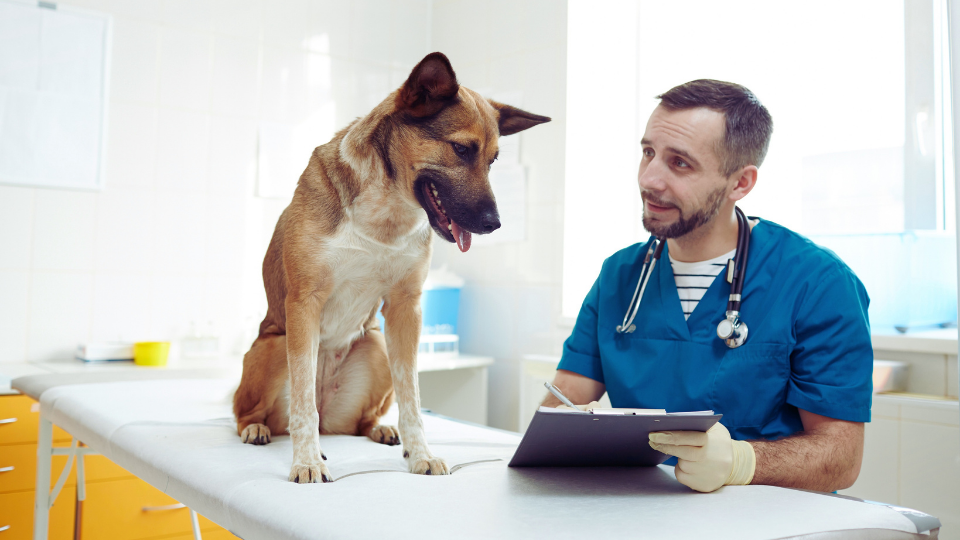Dog Health Issues: Common Conditions by Breed, Size, Age
When you adopt a dog, the last thing you want to think about is what types of health problems they might face in their lifetime. But part of being a responsible pet parent is educating yourself about the most common symptoms of a sick dog and ensuring you have access to a veterinarian. Some conditions can be hard to detect, and you never want to wait until it’s too late.
Read up on some of the most common health issues in dogs and the clinical signs to watch out for to ensure your pet’s highest quality of life. Or, if you want to learn more about a specific canine condition, navigate using the links below.
Table of Contents:
Sick Dog Symptoms
Dogs can’t tell us how they are feeling, so the only way to know if your dog is sick is by paying attention to the potential signs. Some of the most common sick dog symptoms include:
- Changes in energy level
- Sudden changes in daily habits, behavior, or personality
- Changes in urine, stool, or frequency of urinating or defecating
- Evidence of pain while walking or running
- Diarrhea
- Coughing or hacking
- Excessive salivation or thirst
- Dry and itchy skin
- Excessive vomiting
- Unexplained weight loss
- Loss of appetite
- Fever
Generally, if your dog is behaving unusually, it’s a good idea to take them to the vet for a checkup. The sooner you can figure out what’s wrong with your dog, the sooner you can get them the treatment they need.

💡 Pro Tip: With a dog insurance plan in place, pet parents are more likely to take their dog in for a checkup at the first signs of concern for a quick diagnosis. If you hold off due to fear of expensive vet visit costs and wait to see if your dog’s symptoms subside, their condition could worsen substantially. Compare pet insurance plans to see which providers offer coverage for veterinary examinations, diagnostic tests, and more.
Common Health Problems in Dogs
Let’s take a look at the various dog health issues the above symptoms might indicate.
Arthritis
Canine arthritis is the inflammation of the joints, and it’s a very common health issue in older dogs. The condition can cause pain and stiffness, impacting the dog’s ability to exercise.
Thankfully, there has been a great deal of research into treating canine arthritis. It can be treated with medication, physical therapy, and homeopathic remedies. Glucosamine for dogs has also been found very effective at preventing and alleviating the symptoms of arthritis.
Obesity
Nearly 60% of dogs are either overweight or obese, according to recent statistics. Obesity increases the dog’s risk of certain types of cancer, arthritis, diabetes, heart disease, and hypertension.
The best way to avoid and treat canine obesity is to provide your dog a healthy diet and give them regular exercise. Avoid the urge to overfeed them just because they seem hungry (or because they’re cute and deserving of treats!) because dogs require far fewer calories than we do. It’s best to consult your veterinarian before changing your dog’s food or exercise routine.
Dental Diseases
Dental disease in dogs may vary, but it’s typically the result of an unclean mouth. According to Hill’s Pet Nutrition, 80% of dogs will have some sign of dental disease by the age of two. Periodontal disease, also known as gum disease, is the most common form and it’s caused by ba
In some cases, a dog’s teeth may become so rotted by bacteria that they require surgical removal to prevent the infection from spreading to the jaw and skull. The best way to prevent oral disease is with regular dog dental care.
Allergies
Skin allergies in dogs are more common than food allergies, and they must be managed regularly. Most skin allergies reveal themselves in the form of atopic dermatitis — red, itchy, scaly skin that causes your dog to scratch excessively.
Just like humans, many dogs show clinical signs of skin allergies during the spring and summer when allergens are abundant and cause seasonal flare-ups.
Allergies can’t be cured, but they are easily manageable. Skin allergies can be treated with medication, such as Benadryl for dogs, whereas food allergies may require a prescriptive diet.
Skin Infections and Hot Spots
Skin infections usually occur when a dog suffers a scratch or abrasion, then bacteria infect the wound. This can cause redness, inflammation, itching, and irritation, resulting in a “hot spot.” The best way to help your dog avoid skin infections is to bathe them regularly and to seek veterinary help if your dog suffers a scratch or abrasion. Yeast infections in dogs are less severe than bacterial ones, but nonetheless uncomfortable and deserving of veterinary care.
To treat dog skin infections, a veterinarian will typically clean the affected area, prescribe oral medication or topical treatments, and provide a “cone” collar to prevent the pup from irritating the area further.
Benign Tumors
Benign tumors usually take the form of harmless fatty deposits or skin lumps. Unlike malignant tumors, they are unlikely to spread to other parts of the body or cause the dog serious harm.
If you see any lumps on your dog’s skin, you should get them checked by a vet to determine if they are benign or not. The veterinarian will need to conduct a biopsy of the tumor’s tissue to determine the best options for treatment.
Parasites
Some of the most common types of parasites in dogs are internal parasites (heartworms), intestinal parasites (hookworms and ringworms), and external parasites (fleas and ticks). A parasite can enter or attach to your dog's body when they eat something contaminated or if they come into contact with another animal that has the parasite. Coccidia in puppies and Giardia in dogs are also common conditions that are often transmitted through contaminated water sources.
Note: These parasites are not to be confused with ringworm in dogs, which is caused by a fungus infection and is contagious to humans.

Ear Infections
Ear infections can be caused by several environmental and hereditary factors, including allergies, autoimmune disorders, wax buildup in the ear, and even excessive cleaning. Dogs often show signs of an ear infection when they scratch or shake their heads excessively. Odor, dark discharges, and redness or swelling in the ear canal can also be signs of an ear infection.
After a vet’s diagnosis, dog ear infections are usually treated with a medicated cleanser, topical medication, or possibly oral antibiotics and anti-inflammatory drugs. According to the American Kennel Club, most ear infections in dogs are resolved within one to two weeks.
Urinary Tract Infections (UTI)
The most common signs of urinary tract infections in a dog are frequent need to urinate, signs of pain or discomfort when urinating, and blood or other discharge in the dog’s urine. If your dog shows any of these symptoms, it’s important to consult a veterinarian immediately, as they could also be signs of a more serious issue like bladder stones or urinary blockage.
Soft Tissue Injuries
A soft tissue injury occurs when a dog pulls a muscle, sprains a joint, lacerates skin, or causes similar damage to the canine soft tissue, including cruciate ligament conditions. Unlike the common illnesses in dogs we’ve discussed thus far, these issues are caused by physical accidents rather than an immune system response.
Other less common examples of accidental injuries include bites, broken bones, lodged foreign objects, and ingested toxins. The cost to stabilize, treat, and monitor these health concerns is included in standard Accident-Only pet insurance coverage. Many of these injuries are considered emergency medical conditions that require immediate treatment and can get expensive without pet insurance.
💡 Pro Tip: Pet insurance is worth the cost because not only can you save hundreds of dollars on unexpected veterinary bills, but it also provides invaluable peace of mind by knowing your loved one will always have access to gold-star care.
Dog Health Issues by Breed
Many popular dog breeds are prone to illnesses and genetic disorders, known as hereditary conditions, due to affected genes passed down to them through the breeding process. Over the past couple of centuries, dogs have been strategically bred for their physical attributes. However, each time they mate within the same breed, they limit their future offspring’s gene pool, resulting in breed-specific health risks.
According to Scientific American, “As a result, purebred dogs not only have increased incidences of inherited diseases but also heightened health issues due to their bodily frames and shapes, such as hip dysplasia in large breeds like the German Shepherd and Saint Bernard, and patella luxation, or persistent dislocation of the kneecap, in toy and miniature breeds.”

Dog Breeds with Hereditary Conditions
Below, we’ll take a look at some of the most popular dog breeds, so you can get a sense of the dog health issues that have been passed down through each generation.
Beagles
Beagles are more prone to inherited epilepsy than some other dog breeds. Epilepsy is a neurological condition that results in a burst of electrical energy in the brain. This causes the dog’s body to seize or malfunction.
Boston Terriers
Boston Terriers may be more prone to cherry eye, an ophthalmological condition that occurs when part of the dog’s eye tissue protrudes from the eye socket and swells. Additionally, the endocrine disorder known as Cushing's disease is found to be more prevalent in Boston Terriers.
Bulldogs
French Bulldogs are English Bulldogs are more susceptible to multiple health problems, including heart issues, respiratory infection, hip dysplasia, and cherry eye.
Cocker Spaniels
English Cocker Spaniels and American Cocker Spaniels have a higher risk for orthopedic issues than other dog breeds. They can also be more prone to ear infections due to their floppy ears, which trap moisture in their hairy ear canals.
Dachshunds
Due to their long bodies and short legs, Dachshunds tend to be more prone to musculoskeletal conditions like intervertebral disc disease and patella luxation (loose knees).
German Shepherds
German Shepherds are particularly prone to hip dysplasia. Most large dog breeds, including Golden Retrievers and German Shepherds, are prone to dysplasia.
Labrador Retrievers
Young adult Labrador Retrievers suffer more from exercise intolerance and collapse (EIC) than other dogs. This condition can occur among physically fit Labrador Retrievers who suffer weakness and collapse after 5–15 minutes of strenuous exercise.
Poodles
According to the Poodle Club of America, Poodles are more susceptible to Addison’s disease (insufficient production of adrenal hormones), bloat, epilepsy, hypothyroidism, patellar luxation, and other health problems.
Siberian Huskies
Pemphigus foliaceus, a superficial skin disease, is more common in Siberian Huskies than in other dogs. This condition can cause skin crusts and hair loss on the dog’s nose and footpads.
Yorkshire Terriers (Yorkies)
Yorkshire Terriers sometimes have weak or malformed cartilage rings in their windpipes, which can cause tracheal collapse. This is when the trachea, or windpipe, becomes too narrow, resulting in coughing and breathing issues.
💡 Pro Tip: If you own or plan to own a purebred dog, it’s a good idea to sign up for pet insurance as soon as possible while your new family member still has a good bill of health. That way, if a hereditary condition arises later in life, it could qualify for coverage, potentially saving you thousands in lifetime care costs. If you wait to enroll after clinical signs develop, the diagnosis will be considered a “pre-existing condition” and will not be eligible for financial assistance through insurance claims.
Common Conditions in Dogs by Size
Many of the conditions specific dog breeds are predisposed to are the result of their size. As such, some health conditions are more pronounced in small dogs than in large dogs, and vice versa.

Small Dog Health Issues
Some of the most common health issues in small dogs include:
- Brachycephalic Airway Syndrome (upper airway abnormalities)
- Ectropion (outward-turning eyelid)
- Intervertebral Disk Disease (IVDD)
- Mitral Valve Disease
- Patellar Luxation
- Tracheal Collapse
Health Problems in Large Dogs
Some of the most common health issues in large dogs include:
- Aortic Stenosis
- Bloat
- Dilated Cardiomyopathy (Heart Weakness)
- Gastric Torsion
- Elbow and Hip Dysplasia
- Hypothyroidism
- Osteoarthritis
- Wobbler Syndrome
According to a study published in the Journal of Veterinary Medicine, hip dysplasia is prevalent in 15.56% of dogs in North America, regardless of breed.
Health Concerns for Dogs by Age
A dog’s age can play a significant role in the dog’s overall health. Generally, older dogs are more susceptible to illnesses, but that doesn’t mean your dog can’t have a loving and fulfilling life in their golden years. Likewise, some illnesses affect puppies more often than older dogs.
Prevalent Illnesses in Puppies
Many of the diseases that were common in puppies years ago, such as Distemper and Adenovirus (Canine Hepatitis) are rarely seen thanks to the effectiveness of vaccines. But it’s important to ensure your puppy has had all their shots before you can rule them out.
Here are a few of the most common health concerns for puppies:
- Canine Parvovirus (CPV, or “Parvo”)
- Distemper
- Adenovirus
- Leptospirosis (bacterial disease of the kidneys)
- Hypoglycemia (low blood sugar)
- Whelping (birthing) Complications
Senior Dog Health Issues
Older dogs suffer from many of the same ailments as older humans, such as arthritis and cataracts. Here are a few of the most common health problems in senior dogs:
- Arthritis
- Cancer
- Eye Cataracts and Blindness
- Deafness
- Incontinence
- Kidney Disease
- Obesity
Cancer is a challenging illness that is often expensive to treat unless you have pet insurance. It is more prevalent in older dogs and is the leading cause of death in dogs over the age of 10.
How to Keep Dogs Healthy and Happy
Most dogs will have at least one or two health issues during their lifetimes, regardless of their breed. But you can reduce your dog’s risk of health issues by ensuring they have a preventive care routine, also known as a wellness plan. Here are some simple steps you can take to keep your dog healthy.

💡 Pro Tip: Many people add a pet wellness plan to their insurance coverage once they realize how much they spend on dog teeth cleaning costs, flea medication, grooming services, and so forth. Most providers allow you to add it to your insurance policy at any time, but if you enroll while they’re a puppy, you can be reimbursed for the expensive cost of vaccinations and spay/neutering.
Routine Vet Exams
Most veterinarians recommend that pet parents bring their dogs in at least once each year for an examination and wellness checkup. This gives the veterinarian a chance to examine the dog, check for common illnesses, and run regular tests to determine if any preventive measures need to be taken to keep the dog healthy. You should also bring your dog to the vet if they are exhibiting any symptoms of illness or injury.
Grooming and Teeth Cleaning
Most dog owners bathe their dogs regularly, but not as many pay close attention to their dog’s teeth. According to VCA Hospitals, it’s ideal to brush your dog’s teeth at least twice daily or three times per week at a minimum to avoid problems like periodontal disease. Tooth brushing is easier when it’s part of your dog’s daily routine, so start the habit early when your dog is still a puppy, if possible.
Healthy Diet
Most dogs should be fed meals twice a day, and the amount of food they are provided usually depends on their size. Veterinarians recommend only giving dogs 10% of their total calories in the form of treats. Dogs that are overfed can become obese, especially if they are not active.
The type of food you provide your dog may depend on their allergies and other health needs. If you aren’t sure what type of dog food is best for your dog, consult your veterinarian about their proper diet.
Regular Exercise
Dogs need regular exercise to keep their bones, muscles, and joints healthy and to avoid becoming overweight. The ASPCA suggests shooting for 30-minute walks five times a week to keep your dog healthy.
Watch for Symptoms of Illness
Our dogs tend to fall into a rhythm with us, waking us up at the same time every morning for breakfast and a walk. As you get to know your pet, you’ll get to know their regular temperament and habits. Keep an eye out for any deviations in your pet’s behavior and reach out to a veterinarian if they exhibit any clear signs of illness, such as vomiting, diarrhea, or excessive scratching.
Protect Your Dog’s Health with Pet Insurance
Just like humans, dogs suffer from many common health issues. But there’s no reason to let a treatable illness set you back thousands of dollars or impact your dog's quality of life. With regular visits to the vet and a strong pet insurance plan, you can ensure your dog always has access to care when they need it.
You can find the best plan for your unique needs when you search for pet insurance on Pawlicy Advisor.
Key Takeaways
- Purebred dogs have hereditary conditions due to years of breeding within the same genetic pool.
- Dog health issues also arise due to age, size, accidental injury, and common illnesses.
- Staying alert to sick dog symptoms and following a preventive care routine with regular vet visits can help ensure your pet's optimal health.
- Health problems in dogs can arise frequently and expensively, but pet insurance offers financial protection and peace of mind.
Do you want to find the best pet insurance?
Let's analyze your pet's breed, age, and location to find the right coverage and the best savings. Ready?
Analyze My PetAbout Pawlicy Advisor
The pet insurance marketplace endorsed by veterinarians, at Pawlicy Advisor we make buying the best pet insurance easier. By comparing personalized coverage and pricing differences we can save you a ton of money, up to 83% in some instances!
Instantly Compare Pet Insurance Plans
Guides
Determine If Pet Insurance Is Worth It
Comparison Charts
Find Your State
Dog Insurance
DVM
Ricky Walther, DVM, is a small animal general practitioner in the greater Sacramento, California area. Realizing the positive financial and medical impact that pet insurance can provide for pet parents and the profession, he lends support and advice to companies like Pawlicy Advisor "The Pet Insurance Marketplace") that simplify the process of connecting with veterinary financing resources.
